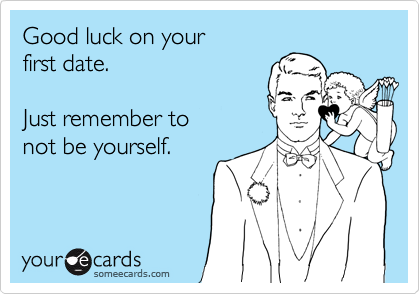When people tell you "Just be yourself," we know they're lying. Being told that insincere reminder merely increases tension and prevents the "real" me from emerging.

Not only that, who says the "real" me is so great? I had to learn that whole "conversation" concept, which is to let the other person talk for a while, as I nod like I'm listening. The "real" me changes, right, presumably for the better? Ergo, I should change. But I should be also keepin' it "real."
My head hurts.
"A Meditation on the Art of Not Trying," by John Tierney, analyzes this idea through the lens of Asian thought, specifically, Taoism vs. Confucianism. The ideal balance is "wu-wei," "effortless action," which is "integral to romance," amongst other things.
But how does action become effortless? Through practice, through ingraining good habits and behaviors. But that's not natural, nor intrinsic, is it?
The way the recently discovered ancient text puts it:
“If you try to be filial, this not true filiality; if you try to be obedient, this is not true obedience. You cannot try, but you also cannot not try.”
Um, clarification, please?
Confucians believed that noble behavior must be learned to the point of second nature; Taoists went the other extreme, no striving, no rituals—natural virtue is in us somewhere, and by being our "real" selves, it will be unleashed. The debate over which way is best continued over the eons, as many other philosophies quibbled.
“Psychological science suggests that the ancient Chinese philosophers were genuinely on to something,” says Jonathan Schooler, a psychologist . . . “Particularly when one has developed proficiency in an area, it is often better to simply go with the flow. Paralysis through analysis and overthinking are very real pitfalls that the art of wu wei was designed to avoid.”
However wu wei is attained, there’s no debate about the charismatic effect it creates. It conveys an authenticity that makes you attractive, whether you’re addressing a crowd or talking to one person. The way to impress someone on a first date is to not seem too desperate to impress.
In a dating column (um, I read the business section right afterward), a gal wrote in complaining that she can never win, no matter what she does on a date. She was soothingly reassured that being true to herself is the best way, and those guys she went out with until then were simply not for her.
. . . what’s the best strategy for wu wei — trying or not trying? Dr. Slingerland recommends a combination. Conscious effort is necessary to learn a skill, and the Confucian emphasis on following rituals is in accord with psychological research showing we have a limited amount of willpower. Training yourself to follow rules automatically can be liberating, because it conserves cognitive energy for other tasks.
But trying can become counterproductive, as the Taoists recognized and psychologists have demonstrated in an experiment with a pendulum. When someone holding the pendulum was instructed to keep it from moving, the effort caused it to move even more.
“Our culture is very good at pushing people to work hard or acquire particular technical skills,” Dr. Slingerland says. “But in many domains actual success requires the ability to transcend our training and relax completely into what we are doing, or simply forget ourselves as agents.”
He likes the compromise approach of Mencius, a Chinese philosopher in the fourth century B.C. who combined the Confucian and Taoist approaches: Try, but not too hard. Mencius told a parable about a grain farmer who returned one evening exhausted from his labors.
“I’ve been out in the fields helping the sprouts grow,” he explained, whereupon his worried sons rushed out to see the results. They found a bunch of shriveled sprouts that he’d yanked to death.
The sprouts were Mencius’ conception of wu wei: Something natural that requires gentle cultivation. You plant the seeds and water the sprouts, but at some point you need to let nature take its course. Just let the sprouts be themselves.

Once I taught myself not to interrupt, initially it was simply sitting on my tongue until the other finished their thought. Now, I actually do listen, and not from bullying my ears into submission. My effort slid into natural action. Still being "real."
I would say be yourself because that's the person who is looking to get married, not some image of an ideal person.
ReplyDeleteThis reminds me that lately I've been feeling that as a ba'al teshuva, I'll never be 100% sure that I'm doing the right thing hakhically, especially compared to an FFB. That's a difficult place to be. I'd like to be at the point of natural action and being relaxed. I thought I was getting there, but lately - not so much.
By the way, there's a Jewish version of the Confucius cartoon that I once came across involving Rashi's wife getting annoyed at his constant commentary on their home life.
ReplyDeleteKeep in mind that FFBs aren't always correct with halacha. Listen to a shiur, we find out that something we've been doing so earnestly is actually not right. Oops.
ReplyDelete"Constant commentary" - good one!
You may be right about FFBs, I'm just struggling with a few things right now.
ReplyDeleteRegarding being yourself, see Peanuts Begins
Shavua tov!
"Peanuts Begins." I was expecting Charlie Brown in a cowl.
ReplyDelete